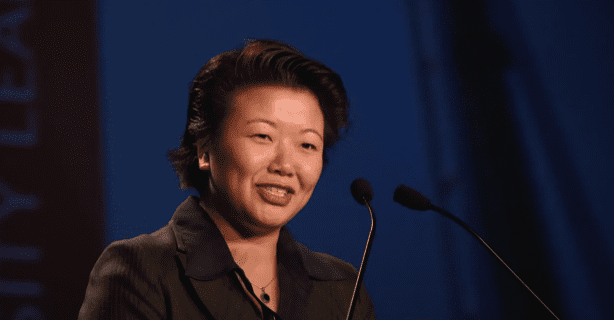In a talk designed to help Williston Northampton School students understand how biased comments can hurt fellow classmates, and how to turn that around, presenter Rosetta Lee explained how dynamics of difference work, and how to stop harm by engaging in courageous conversations. She is one of several speakers on diversity, equity, and inclusion to address the school community this year and in addition to speaking to an all-school assembly, she met with members of the senior administration and with faculty on a day set aside for school-wide anti-bias training.
Lee, a consultant, educator, and activist based at Seattle Girls’ School, said that at the root of most biased comments or actions is a lack of knowledge that the comment could be hurtful. However, that doesn’t mean that the comment doesn’t harm the recipient. For example, she cited her own experience as an American person born in South Korea. People often ask her where she’s from. She answers, “Seattle, Washington.” They persist, “No, where are you really from?” She replies, “I spent some time in Boston?” They continue, “No, where are you really really from?” “South Korea,” she says. Finally, the questioners are satisfied. She said this happens several times a month and can be exhausting. The subtext that underlies the inquiry, she said, is that people who look like her aren’t real Americans.
These questions qualify as microagressions. Microaggressions are unintentional, they accumulate to have a negative impact on the recipient, and they are based on stereotypes. However most people commit microagressions at one time or another because there’s no way to know everything about everyone, said Lee.
Lee said she used to make flip comments about mental health—until someone called her on it. Until then, she said, she didn’t realize that her speech could be hurtful; she was, she said, in a phase of William Taylor’s Reflective Competence Model called “Unconscious Incompetence”—she didn’t know that she didn’t know. Once she was alerted to the fact that her words made an negative impact, she moved into a new phase, “Conscious Incompetence,” when she had to stop and think when she was about to use that type of language. After practicing for some time, refraining from saying those comments became second nature, a phase called “Conscious Competence.” But her work was not done. Once she passed this stage, she continues to educate herself and tries to grow, entering “Reflective Competence.” Work to understand differences is never complete, she said.
Lee offered several tools for how to address behavior such as microagressions for a variety of circumstances. The first tool for confronting a friend or colleague who you feel has the capacity to change: Being A DEAR (an acronym for “Affirm” the person or relationship, “Describe” the behavior without judgement, “Explain” the emotion/impact and your filters, “Assume” positive intent, “Request” or suggest different behavior).
For circumstances in public, for example when someone is telling a racist joke and people are laughing along, or when someone is being a bully, Lee said Being a Witness (saying, for example, “Those kinds of jokes are not acceptable in this community.”) can change social norms.
Finally, Lee shared guidance on how to respond gracefully when someone calls you out for saying something offensive or hurtful. She encouraged people to see the call out as an investment in the relationship, and a chance to learn and grow as a person. The goal is to listen, acknowledge the moment is uncomfortable, and not get trapped into feeling shame, but instead to strive for empathy, connection, and relationships with others. “If I have a growth mindset, I actually show up fundamentally differently in that conversation,” she said.
Some techniques to try include listening with full attention, taking a break to calm down and responding later, and remembering that your mistakes don’t define you. Prioritize the impact of your comment or action over your intent, and offer a genuine apology—not “I’m sorry you took it that way,” Lee said, but something like, “You know, I thought that joke was funny, but now I see it was hurtful and I’m so sorry.”
Having the skills to hold courageous conversations are vital, Lee said, to engaging in a diverse society.

